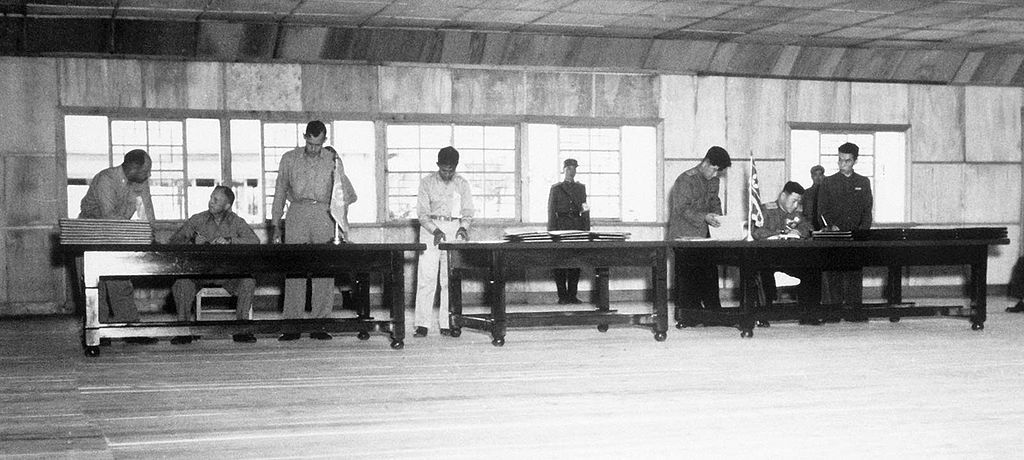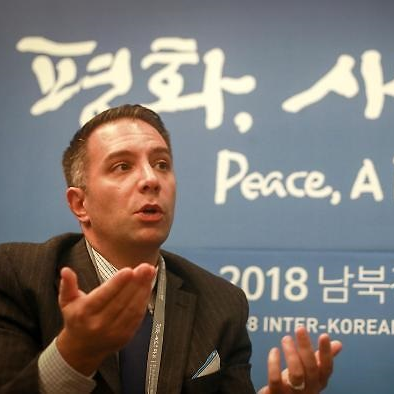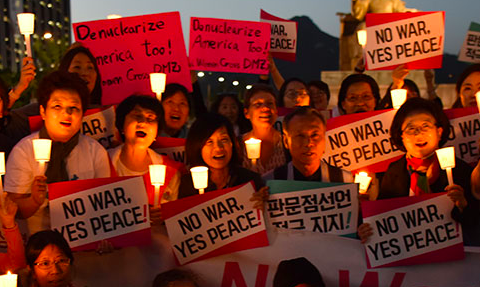Ann Wright reports on the launch earlier this month, in D.C. and New York, of the worldwide “Korea Peace Now” campaign.
By Ann Wright
Special to Consortium News
 While U.S.-North Korean contact is stalled, relations between North Korea and South Korea continue to increase.
While U.S.-North Korean contact is stalled, relations between North Korea and South Korea continue to increase.
One sign of that came earlier this month when a consortium of four international women’s groups launched a worldwide campaign for peace on the Korean peninsula, “Korea Peace Now — Women Mobilizing to End the War,” during the United Nations’ Commission on the Status of Women, held during the week of March 10.
With launch events in Washington, D.C., and New York City, representatives of Women Cross DMZ, Nobel Women’s Initiative, Women’s International League for Peace and Freedom and the Korean Women’s Movement for Peace hosted three female parliamentarians from the South Korean National Assembly. These legislators spoke with many U.S. representatives about supporting South Korean initiatives for peace on the Korean peninsula. They also met with members of the public, academics and think tankers at the Council on Foreign Relations.
Kwon Mi-Hyuk, the leader of the South Korean National Assembly, said that she has been perplexed by how little people in the U.S. — politicians as well as citizens — know about the important developments between North and South Korea in the past year, since the first summit between South Korean President Moon Jae-In and North Korean leader Kim Jung Un on April 27, 2018, in the Joint Security Area of the demilitarized zone. She added that 80 million Koreans on the Korean peninsula, in both the North and South, are depending on the cooperation of the United States to help finally end the 70-year-old hostilities.
Only Reason to Meet
During the same week, the U.S.-based Korea Peace Network held its annual Korea Advocacy Days on March 13-14 in Washington, D.C. Speakers at the conference from all political alignments consistently agreed that meetings now underway — both the high-profile North-South and U.S.- North Korea contacts as well as those rumbling along between the Washington and Seoul— must produce a peace agreement.
Doug Bandow of the libertarian CATO Institute and Harry Kazianis, senior fellow at the Center for National Interest, both said military operations on the Korean peninsula have no place in today’s thinking about national security. Kazianis said that the Hanoi summit in late February between President Donald Trump and Chairman Kim Jong Un, which ended abruptly, was not a failure, but one of the to-be-expected slowdowns in negotiations. He noted that statements of “fire and fury” have not erupted from the White House since the Hanoi summit, nor has there been a resumption of North Korea nuclear or missile testing. North Korean ICBM missile tests, Kazianis said, were the trigger point for the Trump administration. With no restart of those tests by North Korea, the White House is lower-keyed than it was in 2017. Kazianis added that North Korea, with a population of 30 million and an economy the size of that of Vermont, poses no economic threat to the U.S.
After the Hanoi meeting, the Trump administration said North Korea demanded that U.S. lift all sanctions. The North Korean side responded by saying it had asked only for the lifting of some, specific sanctions — not all — as a confidence building measure after it had suspended nuclear weapons and ballistic missile testing.
38 North-South Meetings
In 2018, North and South Korean government officials met 38 times in addition to the three summits between South Korean President Moon Jae-In and North Korean Chairman Kim Jung Un. These contacts occurred while sentry towers in the DMZ were being dismantled, while part of the DMZ was getting demined and while liaison offices between North and South were opening. Train tracks linking the two Koreas have been closely inspected. By opening a way through North Korea and China and Central Asia they are expected, ultimately, to link South Korea with Europe.
Parliamentarian Kwon said the South and North governments hope to be able to reopen the Kaesong Industrial complex in North Korea, which will restart the economic project halted in 2014 by the conservative South Korean Park Geun-hye administration. The complex, which provides a nexus for workers from the North and foreign currency from the South, is an hour’s drive from the South Korean capital Seoul and has direct road and rail access to South Korea. In 2013, 123 South Korean companies in the Kaesong complex employed approximately 53,000 North Korean workers and 800 South Korean staff.
Kim Young Soon of the Korea Women’s Associations United said three meetings between civil society groups in South Korea and North Korea occurred in 2018, all aimed at reconciliation. In a recent poll, 95 percent of young people in South Korea favor of dialogue with North Korea.
Nobel Peace Laureate Jodie Williams, chair of the Nobel Women’s Initiative, noted that the United States is one of the few countries that refused to sign the Landmine Treaty, claiming that landmines are needed to protect U.S. and South Korean military in the DMZ.
Williams, who visited the DMZ many times in the 1990s in her work to ban landmines, returned there in December 2018 while South Korean soldiers were dismantling sentry posts and removing landmines as a part of the North-South cooperative agreements. Williams said that one soldier told her, “I went to the DMZ with hate in my heart, but the more we interacted with North Korea soldiers, the hate went away. I thought of North Korean soldiers as my enemy, but now that I have met them and talked with them, they are not my enemy, they are my friends. We as Korean brothers just want peace, not war.”
On the theme of women, peace and security, Williams added, “When only men lead peace processes, the main issues that are addressed are guns and nukes, neglecting root causes of conflict. Guns and nukes are important to address, but this is why we need women at the center of peace processes — to discuss the impact of wars on women and children.”
Resolution 152
U.S. Rep. Ro Khanna spoke to the spoke to the Korean Advocacy group about House Resolution 152, which asks Trump to declare an end to war with North Korea, the longest state of war in U.S. history. Member organizations of the Korea Peace Network will be asking their members to press their members of Congress to sign onto the resolution. The resolution currently has 22 co-sponsors.
“We Koreans, in both the North and the South, have deep scars from the World War II war and the division of our country after World War II,” said Mimi Han of the Young Women’s Christian Association and the Korean Women’s Movement for Peace. “Korea had nothing to do with the war. We were occupied by Japan for decades before the war and yet our country was divided, not Japan. My mother was born in Pyongyang. Seventy years later, trauma is still living in us. We want peace on the Korean peninsula-finally.”

UN delegate (seated left), and Korean People’s Army and Chinese People’s Volunteers delegate (seated right) signing Korean War armistice agreement at P’anmunjom, Korea, July 27, 1953. (F. Kazukaitis, U.S. Navy via Wikimedia)
Fifteen of the 17 countries that comprised the “UN Command” during the Korean War have normalized relations North Korea and have embassies there now. The United States and France are the only exceptions.
The unification communique signed in 2018 by Moon, the president of the South, and Kim, the leader of the North, refers to a moment of “great historic transformation.” It goes on to itemize specific steps for confidence building and underscores a vision of peace, trilateral meetings with the U.S., the reunification of families, joint economic-development and regular contacts between the leaders of the two countries.
This all goes far beyond general concepts Trump was willing to sign in the communique following his first meeting with North Korea leader Kim. Their second abruptly ended without a communique and cross talk.
Several speakers at the Korean Advocacy Days conference noted that the influence of war hawk John Bolton, Trump’s national security advisor, dramatically changed the dynamic of the summit in Hanoi. As long as Bolton and his long-standing group of regime-change allies in the Contract for a New American Century remain in the White House, Trump’s goal of reaching an agreement with North Korea will be stymied.
Ann Wright served 29 years in the U.S. Army/Army Reserves and retired as a colonel. She was a U.S. diplomat for 16 years and served in U.S. Embassies in Nicaragua, Grenada, Somalia, Uzbekistan, Kyrgyzstan, Micronesia, Afghanistan and Mongolia. She resigned from the U.S. government in March 2003 in opposition to President George W. Bush’s war on Iraq. She is co-author of “Dissent: Voices of Conscience.”
If you value this original article, please consider making a donation to Consortium News so we can bring you more stories like this one.
Please visit our Facebook page, where you can join the conversation by commenting on our articles to help defeat Facebook censorship. While you are there, please like and follow us, and share this piece!





Thanks Ann
In general, Koreans, both north & south are the most Confucius oriented societies on earth. This is important to remember when treating with them. Westerners may have difficulty getting a grasp on this. The conservative side of Korean culture is firmly rooted in the proper order of their society. Men and women have clearly defined roles. We get a hint of this in the quote from the article:
“Guns and nukes are important to address, but this is why we need women at the center of peace processes — to discuss the impact of wars on women and children.”
Family is very, very important to Korean society, with roots even deeper than Confucius—reaching into archaic ancestor worship.
The division of north and south Korea has been like a punch in the gut for Koreans for 70 years.
Peace will be enlightening.
I had the unique opportunity to have dinner with two Korean families when we were all associated with the Tacoma Guitar factory. A lump on the log, I just happened to be there and was invited to eat. We did not share a language, but they were surprised as to how much I loved Korean food. I got to observe some of the aspects of their culture that I had heard about: The women served the men and casually hung out with us but ate separately. Women stayed home—men worked. I, as guest was treated first and foremost—with honor. There is more but you get the picture.
Endeavoring to cram American values down the throats of other societies is vulgar and insulting.
Koreans are mostly polite people. So when some of them go to the USA and express the hope that the latter country could play a constructive role, it should be up to Americans to have some self-awareness and understand that, in fact, the US is the problem. The Korean conflict concerns first the two Koreas, and second the immediate neighbours: China, Russia, and Japan. However one feels about Pyongyang’s overtures, South Korea is quite capable of defending its own territory; the 30000+ orcs on the peninsula serve an offensive, not defensive purpose (see also: Europe and oh well most of the rest of the world). Yankee go home.
I know girls like to socialize among themselves and there’s nothing wrong with that. But if you, the above notwithstanding, intend to have a political impact, why would you segregate yourselves into sex-exclusive women’s groups? Think none of us men care about peace?
Trump likes to play the roll of the good cop in his private meetings with Kim, Putin and Xi, while letting his henchmen Pence, Pompeo, Abrams and Bolton play the roll of the bad cops. It’s so obvious.
from the article:
Williams said that one soldier told her, “I went to the DMZ with hate in my heart, but the more we interacted with North Korea soldiers, the hate went away. I thought of North Korean soldiers as my enemy, but now that I have met them and talked with them, they are not my enemy, they are my friends. We as Korean brothers just want peace, not war.”
I believe that this sentiment, from a soldier who must be considered “ordinary” in South Korea, is widely held throughout the peninsula. The extraordinary photographs, last year, of Kim and Moon’s embracing is another indication. So in my view the reunification process WILL take place, perhaps sooner than a couple of generations away, given the enormous interest in this happening. Also, however, Ann’s last paragraph suggests this reasonable, long overdue step being delayed or entirely prevented.
With Bolton and Pompeo and their Democratic compatriots evidently in charge of foreign policy, the essential international playbook for neoliberalism, including regime change, must be ended, or significantly humiliated and reversed, rather than further manipulated and fostered. Moon needs to step up with firmer resolve to diminish US influence, including eliminating the bases, but unfortunately this is not happening. His popularity, due to recently caving in to Trump demands to pay for Korean workers on the bases, has plummeted from 70% last year to something like 40%.
If Moon could muster the courage and support to say “OUT!” to the US, a collective cheer would rise on the peninsula heard all the way to New York.
Let the Koreans work this out according to their own needs and prerogatives with the US and its weird dysfunctional culture butting out.
” On the theme of women, peace and security, Williams added, “When only men lead peace processes, the main issues that are addressed are guns and nukes, neglecting root causes of conflict. Guns and nukes are important to address, but this is why we need women at the center of peace processes — to discuss the impact of wars on women and children. ”
Lesley Stahl (of CBS News): [on Iraq] “We have heard that half a million children have died. I mean, that’s more children than died in Hiroshima. And, you know, is the price worth it?”
Madeleine Albright: “I think this is a very hard choice, but the price—we think the price is worth it.”
Hillary Clinton was behind the US destroying Libya’s government and Libya, which was probably the best place in northern Africa for women and children.
Samantha Power tweet: Reports devastating: 100s dead in streets, including kids killed by chem weapons. UN must get there fast & if true, perps must face justice.
She was participating in or duped by obvious false flag attacks in Syria designed to further US deep state efforts aimed at control of pipeline routes and geopolitical power politics.
Samantha’s “Duty to Intervene” is a real tool for the murderous Brennans of US geopolitics.
Hillary Clinton was the prime mover for the US supporting jihadi terrorists in Syria which took what probably would have been a small limited rebellion in Syria against a secular quasi-dictator, and turned it into something that cost 500,000 lives with massive scale raping, beheadings (including children), training children to be terrorists and so on.
Women and children in South Korea and Japan have it pretty good.
Stories coming out of North Korea indicate something way different, especially in the concentration camps located there.
Let the Koreans work this out according to their own needs and prerogatives with the US and its weird dysfunctional culture butting out.
I believe that Kim Jong Un actually understands the critical necessity of including the women’s perspective, far better than most westerners. The prominence of his sister in the process cannot be denied, even if in their case the policies are NOT diametrically opposed as they seem to always be in the west.
There appears to be little analysis of the economic and political structure to which a unified Korea might progress, which could be a model of social democracy, that the US oligarchy would seek to destroy. Without bully capitalism and fake democracy in Korea, the US politicians will cooperate only if bribed, or persuaded that other targets bring more bribes.
There appears to be little debate or planning for the nuclear status of a unified Korea. We cannot expect them to relinquish nuclear defenses in their location between superpowers, and this is a major contribution of NK to their union.
The US could make itself the “bad cop” unifying NK+SK in economic defense, while offering the “good cop” protection in case one of them attacked the other before full cultural unification. But that would be a complete accident with the USG in the hands of bumbling corrupt oligarchy warmongers.
I haven’t seen anybody either North or South say they are aiming for reunification anytime soon. The current program is for peace and normalization of relations, and ending DPRK isolation.
The Koreas don’t seem inclined to take the German route of immediate reunification as soon as the cold war ends.
Yes, after such extreme polarization it appears that two generations of peaceful cooperation might be needed, to allay fears and work toward unification of political systems and military commands. They are fortunate to have a substantially common culture like Germany.
“Kwon Mi-Hyuk, the leader of the South Korean National Assembly, said that … 80 million Koreans on the Korean peninsula, in both the North and South, are depending on the cooperation of the United States to help finally end the 70-year-old hostilities.”
If the Assembly member is depending on U.S. cooperation on the road to peace, she’s going to need a plan B.
Still, while the U.S. can still delay the North-South rapprochement, it’s hard to see how it can stop or reverse it.
I keep saying that the Koreas don’t need US permission to make peace. I just read that Trump has ordered the cancellation of the new and improved sanctions that the US was going to impose and that caused Kim to say he was going to walk away from the negotiations. Good for NK. Somebody has to teach the US that in a negotiation, you give some, you get some. It’s not give me everything I want and then we’ll see if you get anything. I also don’t see a big boon coming to the US when this all gets sorted out. The big winners are most likely to be Russia and China.
Trump is a dangerous fool who no one should ever trust about anything. If there is to be real peace, it must be founded on congress and the American people, not the liar in chief.
It’s so good to have Ann Wright report this news of S Korea and N Korea negotiating a peaceful path to end the 70 year old Korean War as it is to have Consortium be the vehicle for retired Colonel Wright to inform us all from this all too often unreported perspective. It drives me totally crazy to how most all of the news concerning the reunification of the two Koreas reported in America is never about what the Korean people think or see. No instead we only get reports to how the USA sees this decades long struggle to bring peace to the Korean Peninsula. So it’s about time we hear it from the Korean perspective. Thanks Colonel Wright and thank you Consortium for what you do to bring us this news.
This is interesting…
https://thehill.com/homenews/administration/435329-trump-says-hes-reversing-north-korea-sanctions-imposed-by-his
So Trump tweets the “withdrawal” of some new “Sanctions” (always capitalized in Trump Twitterese). What do we know from that?
Perhaps his tweet’s reference to “additional large scale Sanctions” on North Korea that were “announced today by the U.S. Treasury”, means Treasury’s announcement *yesterday* targeting two *Chinese* shipping companies for allegedly evading DPRK sanctions.
Or perhaps not. Do we know? Does Trump?
Whatever he is referring to, will the tweet become policy, or will it end up like Trump’s pledge of complete and immediate military withdrawal from Syria, which not only hasn’t taken effect, but (according to his subsequent statements) was never made in the first place?
If Trump did mean yesterday’s move against the Chinese companies, and if he does reverse it, why should we assume his decision has anything to do with the Korean situation at all, when it could actually be in response to these Chinese firms or the Chinese government phoning Wilbur Ross or Ivanka and securing this service in exchange for some past or future business favor?
What I’m saying is, to paraphrase Barbara Bush, why should any of us waste our beautiful minds trying to find meaning in this idiot’s digital dreck?
When Trump actually does something to help progress in Korea we can acknowledge it – in the meantime, I don’t see any reason to pay attention to him.
Yes, the article’s perspective is unusual and valuable.
Many thanks Joe for pointing that out. We’re getting here at CN the News that the MSM should have been reporting all along. And, if the media were really functional, we would have heard by now many local reports from the different sides of this immensely important Story but, unfortunately Zero… Thank you Ann Wright.
The abrupt ending of the last summit may revolve around the likely CIA raid on the North Korea embassy which stole the data of the North Korea’s chief negotiator who had been North Korea’s ambassador to Spain.
Quite possibly this is what T bragged about when T stated USA knew things about North Korea previously undisclosed.